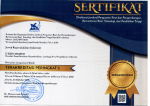KONDISI SOSIAL EKONOMI DAN PEMBERDAYAAN NELAYAN TANGKAP KOTA TEGAL, JAWA TENGAH
Abstract
Keywords
Full Text:
PDFReferences
Amir, Yayat Hidayat. 2005. Identifikasi Karakteristik Sosial Ekonomi dan Persepsi Masyarakat Sasaran Program Penyediaan Rumah Susun Sederhana Sewa (Rusunawa) di Kota Tegal.
Arpiani, Riski. 2009. Kehidupan Sosial Budaya Dalam Kaitannya Dengan Perilaku Ekonomi Masyarakat Nelayan (Studi Terhadap Kemiskinan Di Kelurahan Muarareja Kecamatan Tegal Barat Kota Tegal). Skripsi. Tidak dipublikasi. Unnes.
BPS. 2012. Tegal Dalam Angka.
Dahuri, R., J. Rais, S.P. Ginting, S.P dan M.J. Sitepu. 2004. Pengelolaan Sumberdaya Wilayah Pesisir Dan Lautan Secara Terpadu. PT. Pradnya Paramita, Jakarta.
Daryono, Yono. 2008. Tegal Stad: Evolusi Sebuah Kota. Kantor Informasi dan Humas Kota Tegal. Tegal.
FAO. 2001. Indicators for Sustainable Development of Marine Capture Fisheries. FAO Technical Guidelines for Responsible Fisheries. No. 08 Food and Agriculture Organization (FAO) Rome.
Hermawan, M. 2006. Keberanjutan Perikanan Tangkap Skala Kecil. Disertasi. Tidak di Publikasi http://unnes.ac.id
Jurnal Kependudukan Indonesia Vol. 9 No. 1 Tahun 2014 (ISSN 1907-2902) 57
Masyuri, I. 2001. Pemberdayaan masyarakat nelayan. Media Presindo, Jogjakarta.Pascasarjana Institut Pertanian Bogor.
Rangkuti, F.1995. Analisis SWOT: Teknik Membedah Kasus Bisnis- Reorientasi Konsep Perencanaan Strategis Untuk Menghadapi Abad 21. PT. Gramedia Pustaka Utama
Rochani, Hamam Ahmad. 2005. Ki Gede Sebayu: Babad Negari Tegal. Intermedia Paramadina. Tegal
Sebenan, R.D. 2007. Strategi pemberdayaan rumahtangga nelayan di Desa Gangga II kecamatan Likupang Barat Kabupaten Minahasa Utara. Fakultas Perikanan dan llmu Kelautan, Universitas Sam Ratulangi, Manado.
Smith, I.R. 1983. A Research Freamwork for Traditional Fisheries. International Center For Living Aquatic resources Management (ICLARAM), Manila.
Susilowati (2002). Kajian Partisipasi Wanita dan Istri Nelayan Dalam Membangun Masyarakat Pesisir (Studi Kasus pada Perkampungan Nelayan di Demak. Jawa Tengah. Laporan Penelitian Kerjasama UNDIP dengan Mc Master University of Canada.
Triarso, Imam. 2013. Potensi Dan Peluang Pengembangan Usaha Perikanan Tangkap Di Pantura Jawa Tengah. Jurnal Saintek Perikanan Vol. 8. No. 1, 2012
Undang-Undang Republik Indonesia Nomor 31 tahun 2004 tentang Perikanan
Undang-Undang Republik Indonesia Nomor 45 Tahun 2009 tentang Perubahan atas Undang- Undang Nomor 31 Tahun 2004 Tentang Perikanan
Utami, Shinta Karina. 2012. Pengaruh Pemberian Kredit KUD Karya Mina Terhadap Pendapatan Nelayan Tradisional Di Kota Tegal. Fakultas Pertanian Universitas Sebelas Maret. Surakarta
Widyanto,D. 2002. Pemberdayaan Masyarakat Pantai untuk Meningkatkan Kesejahteraan Masyarakat Nelayan. Kasus Tanjung Pakis Kabupaten Karawang. Jawa Barat. IPB Press.
DOI: https://doi.org/10.14203/jki.v9i1.10
Copyright (c) 2016 Jurnal Kependudukan Indonesia

This work is licensed under a Creative Commons Attribution-NonCommercial-ShareAlike 4.0 International License.
-----------------------------------------------------------------------------------------------------------------------------
Research Center for Population, Indonesian Institute of Sciences
Widya Graha Building, 7th and 10th floors
Jl. Jenderal Gatot Subroto 10 Jakarta Selatan, Telp (021) 5221687
Website: http:/kependudukan.lipi.go.id;
E-Journal: http://ejurnal.kependudukan.lipi.go.id
Pustaka: http://pustaka.kependudukan.lipi.go.id
-----------------------------------------------------------------------------------------------------------------------------








